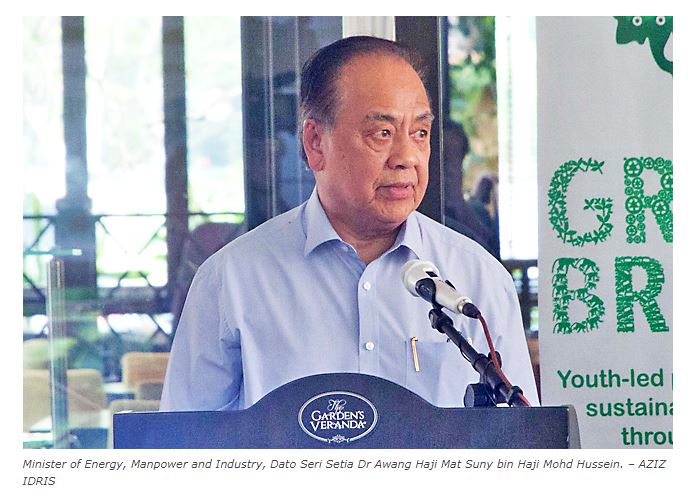Brunei power demands increasing due to development
BRUNEI Darussalam’s demand for power will increase three per cent per annum in the next 10 years, from 3,900 Gigawatt hours (GWh) in 2019 to 5,300 Gigawatt hours (GWh) in 2029.
This is due to the current and upcoming key national projects and developments in the pipeline.
The matter was highlighted by Minister of Energy, Manpower and Industry Dato Seri Setia Dr Awang Haji Mat Suny bin Haji Mohd Hussein in his keynote address at the closing ceremony for the 7th Green Leaders Camp yesterday at Rimba Garden Central.
He said that the world is also facing a global energy transition, where there is a heightened desire to find alternative sources of energy apart from fossil fuels, to power and fuel growth while also being conscious of limiting and mitigating environmental impacts to sustain future generations.
The minister believes that this should be a drive for the youth to think of new business models and drive everyone to think of new innovative solutions to age-old problems as well as new ones.
The Ministry of Energy, Manpower and Industry (MEMI) has recorded a growth in number of social enterprises and non-governmental organisations (NGOs) related to climate issues, as well as youth entrepreneurs tapping on climate mitigation and adaptation opportunities in recent years.
“A total of 96 per cent of the current active registered jobseekers in Brunei comprises youth and we see that the low carbon economic growth itself is a contemporary sector that could potentially address multiple challenges of youth unemployment, job creation and climate change.
“I am delighted to acknowledge that our youth are already leading the race towards a sustainable future for Brunei,” said the minister.
According to the International Renewable Energy Agency (IRENA), the renewable energy sector employs at least 11 million people worldwide as more and more countries venture into manufacturing, trading and installation of renewable energy technologies every year.
Other low carbon related jobs or “green jobs” as it is commonly called are becoming more and more prominent now, and are requiring different skills set.
“Looking ahead, we have to be mindful of balancing economic growth with sustainable development, as mentioned earlier. At the Ministry of Energy, Manpower and Industry, we are counting on developments in both the energy and industrial sectors to spur the creation of job opportunities and contribute to economic diversification,” he added.
In the upstream oil and gas sector, the Ministry of Energy, Manpower and Industry will be looking into encouraging operators to minimise wastage and reduce emissions through green practices, including the reduction of venting and flaring.
This includes developing downstream oil and gas industries and creating value added and spin off industries.
The minister encouraged micro, small and medium enterprises (MSMEs), and NGOs to work closely with government agencies to see how to further expand upon these opportunities in a sustainable manner, and even capitalise on perhaps reusing what may be seen as waste or debris from these industries to develop new products.
“Successful partnership between policymakers and youth is instrumental in achieving Brunei Darussalam’s low carbon and climate-resilient future while in the bigger picture, aids the realisation of not only the United Nations’, but more importantly Brunei Darussalam’s Sustainable Development Goals, in support of Brunei Vision 2035,” added the minister.
Source: https://borneobulletin.com.bn/brunei-power-demands-increasing-due-development/


 Thailand
Thailand




